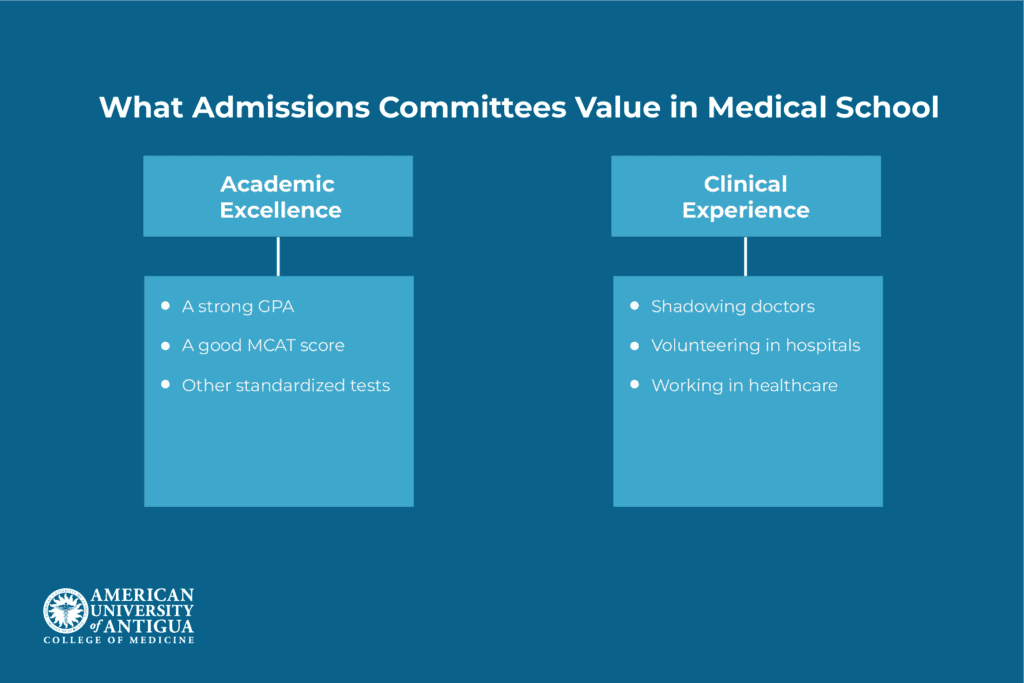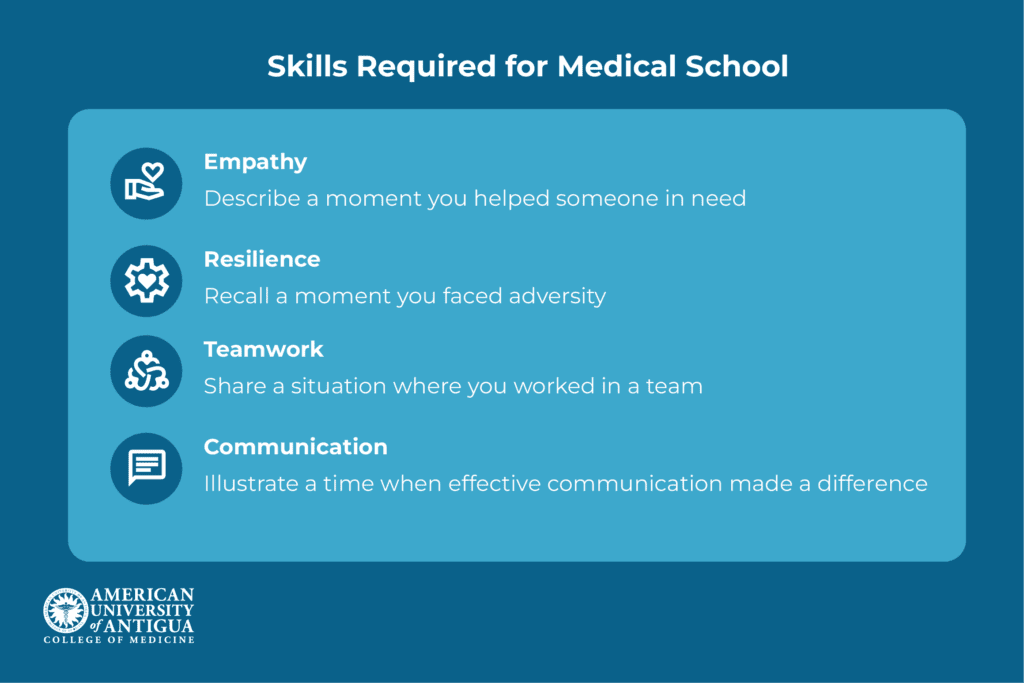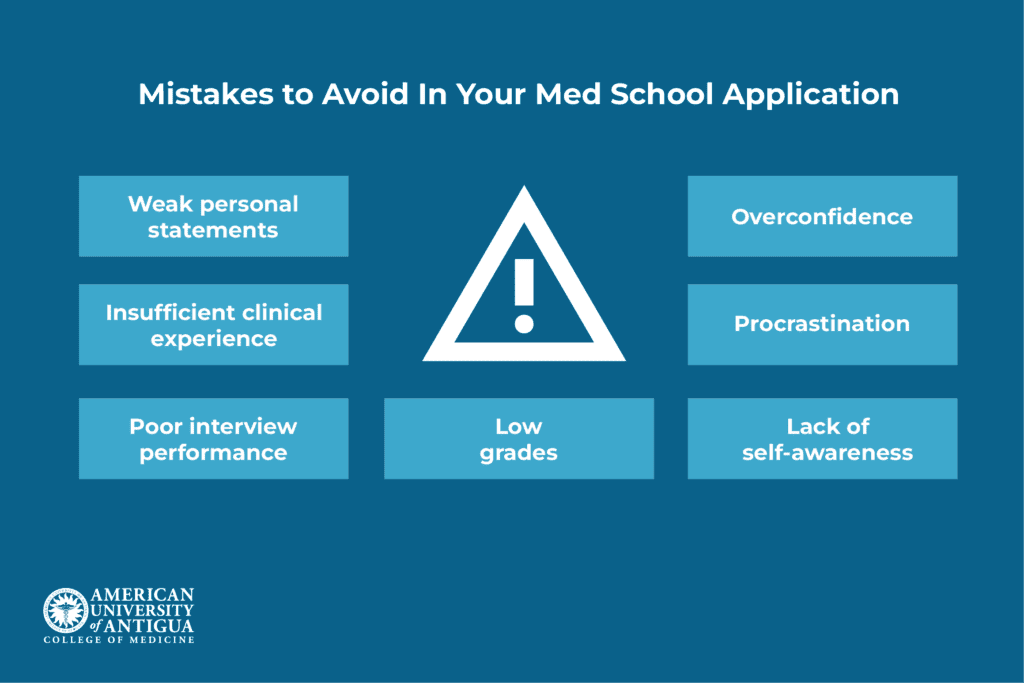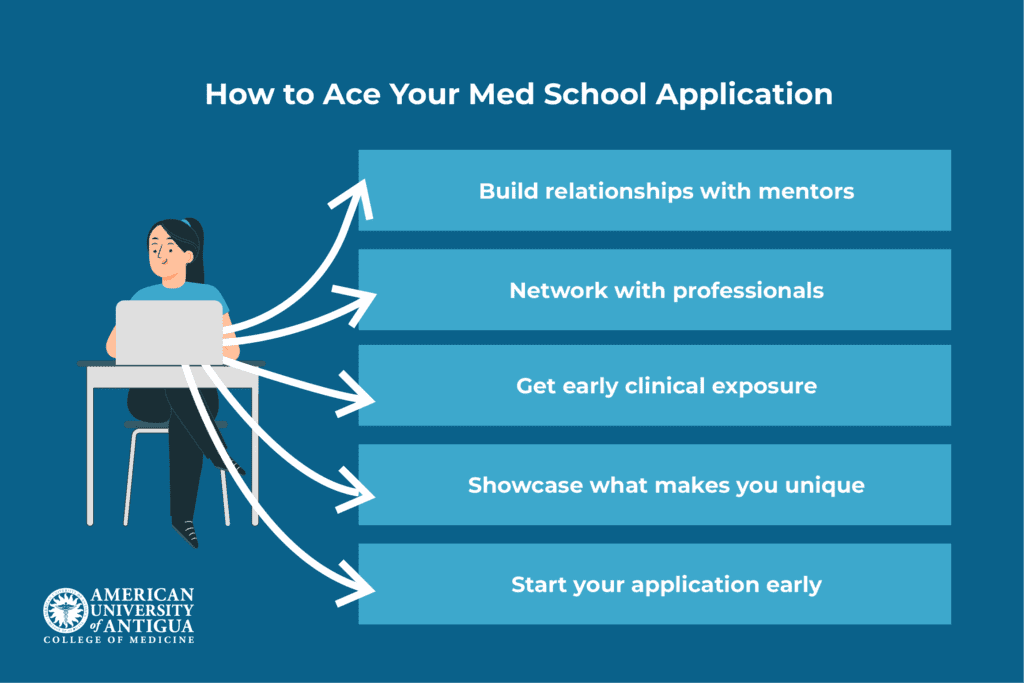What Do Medical Schools Look for in Applicants?
Key Takeaways
- Medical schools take a holistic approach, evaluating applicants based on academic success, clinical experience, empathy, and a genuine passion for healthcare.
- Demonstrating early clinical exposure, volunteer work, and strong interpersonal skills can significantly strengthen your application.
- Understanding what medical schools look for in applicants allows you to tailor your application to stand out in the competitive admissions process.
Securing a spot in medical school is a fierce competition, with thousands of aspiring doctors competing for a limited number of openings. Medical schools carefully evaluate applicants based on a range of factors beyond just grades, including clinical experience, personal qualities, and extracurricular involvement.
Understanding what medical schools look for can give you a competitive edge. By aligning your application with their key criteria – such as a genuine passion for healthcare, strong problem-solving abilities, and a commitment to serving others – you can strengthen your chances of acceptance.
✅ Request information on AUA's MD program TODAY!
YOUR PATH TO SUCCESS BEGINS HERE
What Do Medical Schools Look For
Medical schools take a holistic approach when evaluating applicants. They look beyond academic performance, considering factors such as hands-on experience, personal attributes, and passion for healthcare.
At the American University of Antigua College of Medicine (AUACOM), for example, while MCAT scores are required for processing applications, they’re not the sole determining factor in admission decisions. AUACOM values hard work, commitment, and the student’s drive to make a meaningful impact.
Below, we’ll explore the main factors medical schools consider when evaluating applicants.
Academic excellence
Academic performance plays a crucial role in medical school admissions, with GPA and MCAT scores being key indicators of a candidate’s ability to handle rigorous coursework. Some schools weigh the MCAT more heavily, while others prioritize GPA.
A competitive GPA reflects consistent academic performance, while a strong MCAT score demonstrates readiness for medical school. Ideal scores for the MCAT typically range between 510-520, though requirements vary by school.
If your GPA is on the lower side, showing academic improvement through post-baccalaureate courses or higher grades in later years can strengthen your application and demonstrate your commitment to growth.
Clinical experience

Hands-on clinical experience is another important factor for medical school applicants, as it demonstrates a genuine understanding of patient care and healthcare settings. Shadowing doctors, volunteering in hospitals, or working in healthcare environments allows students to develop communication skills, empathy, and insight into the daily realities of medicine.
Clinical experience not only helps applicants stand out but also shows a true commitment to the field. Research experience is equally important, showcasing critical thinking, problem-solving, and the ability to contribute to advancements in healthcare.
As an undergraduate, you can get involved in research by reaching out to professors, joining research labs, or exploring summer internship opportunities. This involvement not only strengthens your application but also deepens your understanding of scientific inquiry in medicine.
Extracurricular activities
Extracurricular activities, particularly leadership roles and community service, can set candidates apart in the medical school admissions process. Leadership experience demonstrates initiative, teamwork, and the ability to manage responsibilities, skills that are essential for a successful medical career.
Community service is one of the most impactful ways to show compassion, empathy, and a commitment to helping others. Medical schools value applicants who have made a positive impact on their communities, whether through healthcare-focused volunteer work, tutoring, or organizing local events.
Non-medical extracurriculars, like sports, arts, or student organizations, can also strengthen your application. These activities showcase well-roundedness, time management skills, and the ability to balance multiple responsibilities. The key is to highlight how these experiences have shaped your personal growth and strengthened your readiness for a career in medicine.
Personal qualities and soft skills

Personal qualities and soft skills, such as empathy, communication, resilience, and teamwork, are at the heart of what makes a successful doctor. Medical schools look for applicants who can build meaningful connections with patients, collaborate effectively in teams, and remain resilient in the face of challenges.
Empathy and strong communication skills demonstrate your ability to understand and care for patients, while resilience shows your capacity to handle the challenges of medical training. Teamwork is equally important, as healthcare is all about working together to provide the best care.
Applicants can highlight these qualities by sharing personal stories through essays, interviews, and recommendation letters. For example, they can highlight moments when they faced adversity, worked as part of a team, or helped someone in need. Ultimately, medical schools value applicants who can integrate both the scientific and human aspects of patient care.
Undergrad major
While no specific undergraduate major is required, it’s essential to complete essential science coursework to meet medical school requirements, such as biology, chemistry, and physics. These core subjects lay the foundation for medical education.
That being said, non-traditional majors, like humanities or engineering, can offer unique perspectives that bring fresh insights into patient care, problem-solving, and critical thinking. Balancing a non-traditional major with science courses shows that you can handle both the analytical and compassionate aspects of medicine, making you a well-rounded candidate.
Choosing a major that aligns with your interests while fulfilling medical school prerequisites sets a strong foundation for success.
Letters of recommendation
Letters of recommendation are important for showcasing your character, work ethic, and potential as a future medical professional. These letters give admissions committees valuable insights beyond grades and test scores.
Ideally, recommendations should come from individuals who know you well, such as professors, doctors, or mentors who can speak to your strengths, passion for medicine, and ability to work in a team. To secure strong, personalized recommendations, build meaningful relationships with these individuals throughout your undergraduate years.
Be proactive in reaching out, provide them with information about your goals, and share specific examples of your work.
Personal statement and secondary essays
A memorable personal statement is key to standing out in the admissions process. It should tell a compelling story that connects your passion for medicine with personal experiences and growth, revealing a unique side of your character.
It’s not just about listing achievements but rather showing how your journey has shaped your desire to become a doctor. Storytelling is key here, as it helps create an engaging and authentic narrative.
Common mistakes to avoid include being overly generic, focusing too much on accomplishments without reflection, or writing a statement that doesn’t sound like you. To make your essays compelling, embrace honesty and vulnerability. Reflect on your personal growth, challenges you’ve overcome, and why you’re uniquely suited for a medical career.
Lastly, tailor your response to each school’s specific prompts, demonstrating your genuine interest and fit.
The medical school interview
The medical school interview is a critical opportunity to show admissions committees who you really are beyond your application. It’s your chance to demonstrate communication skills, professionalism, and passion for medicine.
Interviews come in different formats, including traditional one-on-one interviews, Multiple Mini Interviews (MMI), and panel interviews. Each format requires different preparation strategies, so it’s important to understand the specific format you may face.
To prepare for your medical school interview, practice answering common questions like “Why do you want to be a doctor?” and “Tell me about a time you faced a challenge?” but also be ready to adapt to different scenarios, particularly in MMIs where time-based exercises are common.
During your interview, focus on giving authentic, reflective responses and stay engaged with the interviewers. Avoid over-rehearsing or sounding too scripted, as this can come across as insincere. The goal is to show your genuine interest in medicine and readiness for the next step in your journey.
Common Mistakes that Hurt Medical School Applications

When applying to medical school, even small mistakes can significantly hurt your chances of acceptance. Common pitfalls include:
- Weak personal statements that fail to reflect genuine passion and personal growth
- Insufficient clinical experience or a lack of hands-on healthcare exposure
- Poor interview performance, including being unprepared or disengaged
- Low grades or inconsistent academic performance
- Overconfidence leading to neglecting application preparation
- Procrastination in completing essays, securing letters of recommendation, or submitting materials
- Lack of self-awareness, resulting in generic or unconvincing responses
To avoid these mistakes, start early, seek feedback, prepare thoroughly, and stay humble. Being diligent, thoughtful, and honest throughout the application process is essential for presenting your best self.
What Are Medical Schools Looking For in 2025
In 2025, medical schools are focusing on new trends that align with the changing dynamics of healthcare. One major shift is the growing emphasis on diversity and health equity as schools strive to build a more inclusive medical workforce. This focus ensures that future doctors can better relate to and care for individuals from all backgrounds, which is crucial for improving patient outcomes.
Additionally, technological proficiency is becoming increasingly important for ensuring high-quality patient care. Medical students are expected to be comfortable with telemedicine tools, digital health records, and even AI-driven diagnostics. Research experience is also highly valued, as it reflects a commitment to evidence-based practice and lifelong learning – critical qualities for the future of medicine.
Lastly, medical schools are prioritizing interdisciplinary collaboration. Modern healthcare is team-based, making teamwork essential for navigating the complexities of patient care. Thus, schools are looking for applicants who can collaborate effectively with professionals from various fields.
Key Tips for a Competitive Medical School Application

To make your medical school application stand out, start by building strong relationships with mentors – professors, doctors, or anyone in the field who can offer guidance and open doors for you. These connections will help you understand the nuances of the profession and provide insights you can’t find in a textbook.
Networking with medical professionals is essential. The more you immerse yourself in the field, the clearer your path to medicine will become. Getting early clinical exposure not only strengthens your application but also deepens your passion for patient care.
Don’t be afraid to showcase what makes you unique – your background, experiences, and problem-solving skills. Medicine is about more than just science; it’s about how you connect with people and approach challenges.
Also, don’t wait until the last minute to apply. Start early and tailor your application to each school. This shows that you’ve put in the effort and are genuinely interested in what they offer.
Conclusion
When applying to medical schools, admissions committees seek more than just academic performance; they look for well-rounded candidates. Staying proactive is key during your application phase – keep refining your application, seek feedback, and focus on growth. The more effort you put in, the stronger your application will be.
If you’re ready to take the next step in your medical journey, apply to AUACOM’s MD program. We provide diverse clinical opportunities, a global perspective, and an international network that will set you apart in your career. AUACOM is the best option if you’re looking for a unique, high-quality education that prepares you for success!
Frequently Asked Questions
What increases your chances of getting into med school?
A strong academic record, early clinical experience, meaningful extracurricular activities, and well-rounded personal qualities like empathy and resilience increase your chances of getting into med school.
What do medical schools look for in letters of recommendation?
Medical schools look for letters that speak to your character, work ethic, ability to collaborate with others, and potential to succeed in the demanding medical field.
What kind of volunteering do medical schools look for?
Medical schools value volunteering that involves direct patient interaction, healthcare-related roles, or community service that demonstrates compassion and commitment to helping others.
✅ Request information on AUA's MD program TODAY!
YOUR PATH TO SUCCESS BEGINS HERE
✅ Request information on AUA's MD program TODAY!